HSC 210 Health Sociology: Examining Perspectives and Determinants
VerifiedAdded on 2023/04/11
|8
|1887
|426
Essay
AI Summary
This essay provides an overview of health sociology, defining sociology and its role in understanding human societies and health issues. It explores sociological perspectives such as functionalism, symbolic interactionism, and conflict theory, examining their application to health and illness. The essay also discusses the biomedical model and social determinants of health, highlighting inequalities in healthcare delivery systems. It emphasizes the importance of considering social factors, such as family, education, economic status, and religion, in understanding medical conditions and promoting overall well-being. The document is available on Desklib, a platform offering a wide range of study resources for students.
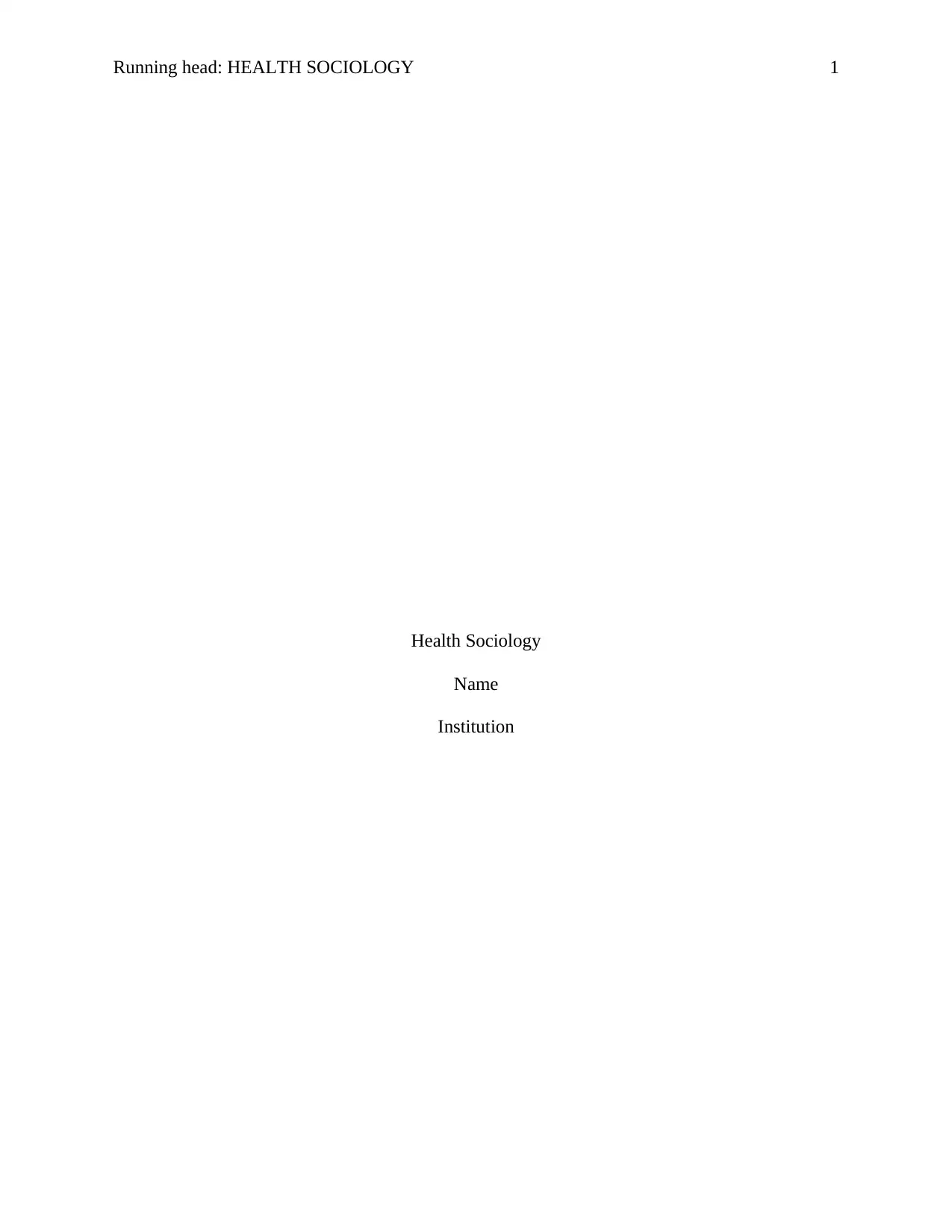
Running head: HEALTH SOCIOLOGY 1
Health Sociology
Name
Institution
Health Sociology
Name
Institution
Paraphrase This Document
Need a fresh take? Get an instant paraphrase of this document with our AI Paraphraser
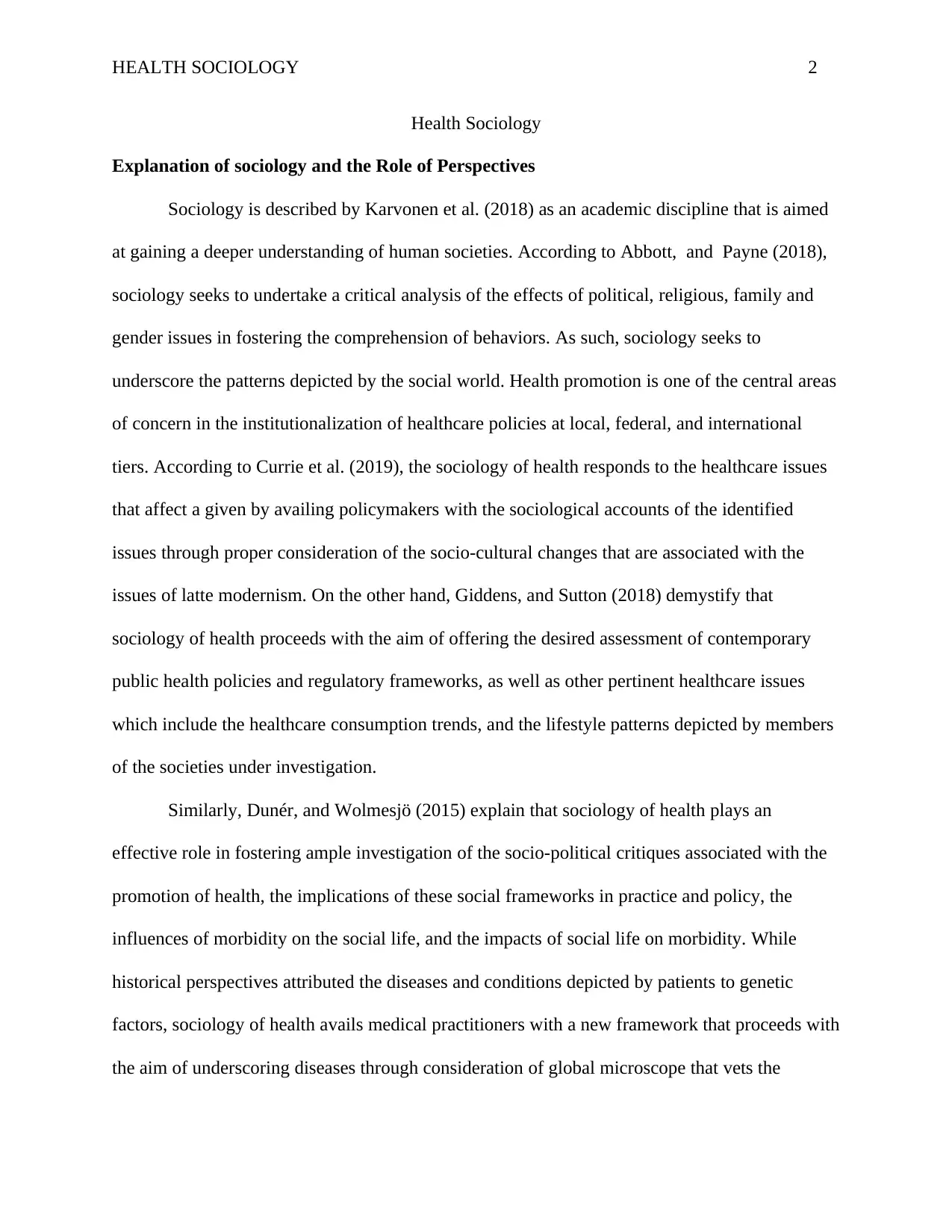
HEALTH SOCIOLOGY 2
Health Sociology
Explanation of sociology and the Role of Perspectives
Sociology is described by Karvonen et al. (2018) as an academic discipline that is aimed
at gaining a deeper understanding of human societies. According to Abbott, and Payne (2018),
sociology seeks to undertake a critical analysis of the effects of political, religious, family and
gender issues in fostering the comprehension of behaviors. As such, sociology seeks to
underscore the patterns depicted by the social world. Health promotion is one of the central areas
of concern in the institutionalization of healthcare policies at local, federal, and international
tiers. According to Currie et al. (2019), the sociology of health responds to the healthcare issues
that affect a given by availing policymakers with the sociological accounts of the identified
issues through proper consideration of the socio-cultural changes that are associated with the
issues of latte modernism. On the other hand, Giddens, and Sutton (2018) demystify that
sociology of health proceeds with the aim of offering the desired assessment of contemporary
public health policies and regulatory frameworks, as well as other pertinent healthcare issues
which include the healthcare consumption trends, and the lifestyle patterns depicted by members
of the societies under investigation.
Similarly, Dunér, and Wolmesjö (2015) explain that sociology of health plays an
effective role in fostering ample investigation of the socio-political critiques associated with the
promotion of health, the implications of these social frameworks in practice and policy, the
influences of morbidity on the social life, and the impacts of social life on morbidity. While
historical perspectives attributed the diseases and conditions depicted by patients to genetic
factors, sociology of health avails medical practitioners with a new framework that proceeds with
the aim of underscoring diseases through consideration of global microscope that vets the
Health Sociology
Explanation of sociology and the Role of Perspectives
Sociology is described by Karvonen et al. (2018) as an academic discipline that is aimed
at gaining a deeper understanding of human societies. According to Abbott, and Payne (2018),
sociology seeks to undertake a critical analysis of the effects of political, religious, family and
gender issues in fostering the comprehension of behaviors. As such, sociology seeks to
underscore the patterns depicted by the social world. Health promotion is one of the central areas
of concern in the institutionalization of healthcare policies at local, federal, and international
tiers. According to Currie et al. (2019), the sociology of health responds to the healthcare issues
that affect a given by availing policymakers with the sociological accounts of the identified
issues through proper consideration of the socio-cultural changes that are associated with the
issues of latte modernism. On the other hand, Giddens, and Sutton (2018) demystify that
sociology of health proceeds with the aim of offering the desired assessment of contemporary
public health policies and regulatory frameworks, as well as other pertinent healthcare issues
which include the healthcare consumption trends, and the lifestyle patterns depicted by members
of the societies under investigation.
Similarly, Dunér, and Wolmesjö (2015) explain that sociology of health plays an
effective role in fostering ample investigation of the socio-political critiques associated with the
promotion of health, the implications of these social frameworks in practice and policy, the
influences of morbidity on the social life, and the impacts of social life on morbidity. While
historical perspectives attributed the diseases and conditions depicted by patients to genetic
factors, sociology of health avails medical practitioners with a new framework that proceeds with
the aim of underscoring diseases through consideration of global microscope that vets the
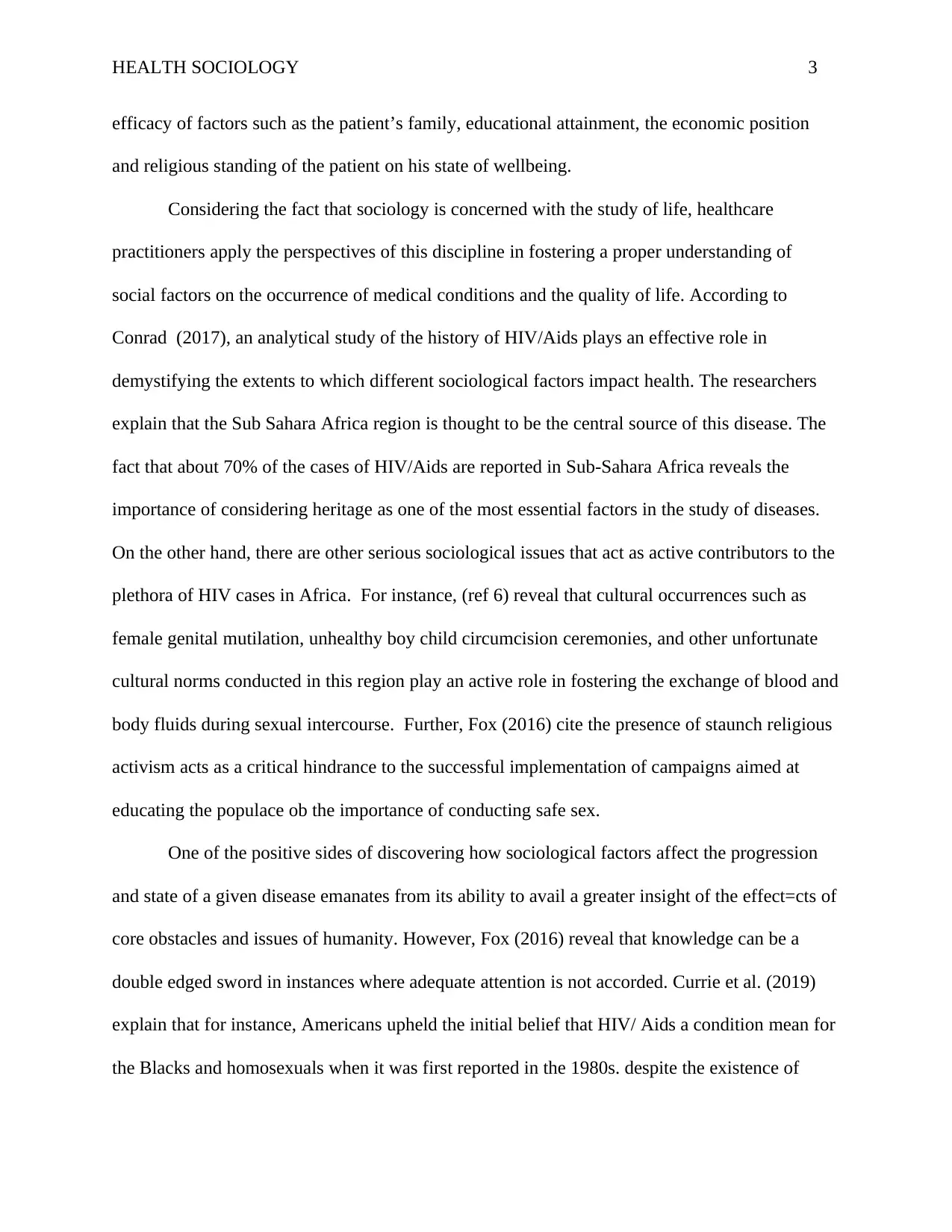
HEALTH SOCIOLOGY 3
efficacy of factors such as the patient’s family, educational attainment, the economic position
and religious standing of the patient on his state of wellbeing.
Considering the fact that sociology is concerned with the study of life, healthcare
practitioners apply the perspectives of this discipline in fostering a proper understanding of
social factors on the occurrence of medical conditions and the quality of life. According to
Conrad (2017), an analytical study of the history of HIV/Aids plays an effective role in
demystifying the extents to which different sociological factors impact health. The researchers
explain that the Sub Sahara Africa region is thought to be the central source of this disease. The
fact that about 70% of the cases of HIV/Aids are reported in Sub-Sahara Africa reveals the
importance of considering heritage as one of the most essential factors in the study of diseases.
On the other hand, there are other serious sociological issues that act as active contributors to the
plethora of HIV cases in Africa. For instance, (ref 6) reveal that cultural occurrences such as
female genital mutilation, unhealthy boy child circumcision ceremonies, and other unfortunate
cultural norms conducted in this region play an active role in fostering the exchange of blood and
body fluids during sexual intercourse. Further, Fox (2016) cite the presence of staunch religious
activism acts as a critical hindrance to the successful implementation of campaigns aimed at
educating the populace ob the importance of conducting safe sex.
One of the positive sides of discovering how sociological factors affect the progression
and state of a given disease emanates from its ability to avail a greater insight of the effect=cts of
core obstacles and issues of humanity. However, Fox (2016) reveal that knowledge can be a
double edged sword in instances where adequate attention is not accorded. Currie et al. (2019)
explain that for instance, Americans upheld the initial belief that HIV/ Aids a condition mean for
the Blacks and homosexuals when it was first reported in the 1980s. despite the existence of
efficacy of factors such as the patient’s family, educational attainment, the economic position
and religious standing of the patient on his state of wellbeing.
Considering the fact that sociology is concerned with the study of life, healthcare
practitioners apply the perspectives of this discipline in fostering a proper understanding of
social factors on the occurrence of medical conditions and the quality of life. According to
Conrad (2017), an analytical study of the history of HIV/Aids plays an effective role in
demystifying the extents to which different sociological factors impact health. The researchers
explain that the Sub Sahara Africa region is thought to be the central source of this disease. The
fact that about 70% of the cases of HIV/Aids are reported in Sub-Sahara Africa reveals the
importance of considering heritage as one of the most essential factors in the study of diseases.
On the other hand, there are other serious sociological issues that act as active contributors to the
plethora of HIV cases in Africa. For instance, (ref 6) reveal that cultural occurrences such as
female genital mutilation, unhealthy boy child circumcision ceremonies, and other unfortunate
cultural norms conducted in this region play an active role in fostering the exchange of blood and
body fluids during sexual intercourse. Further, Fox (2016) cite the presence of staunch religious
activism acts as a critical hindrance to the successful implementation of campaigns aimed at
educating the populace ob the importance of conducting safe sex.
One of the positive sides of discovering how sociological factors affect the progression
and state of a given disease emanates from its ability to avail a greater insight of the effect=cts of
core obstacles and issues of humanity. However, Fox (2016) reveal that knowledge can be a
double edged sword in instances where adequate attention is not accorded. Currie et al. (2019)
explain that for instance, Americans upheld the initial belief that HIV/ Aids a condition mean for
the Blacks and homosexuals when it was first reported in the 1980s. despite the existence of
⊘ This is a preview!⊘
Do you want full access?
Subscribe today to unlock all pages.

Trusted by 1+ million students worldwide
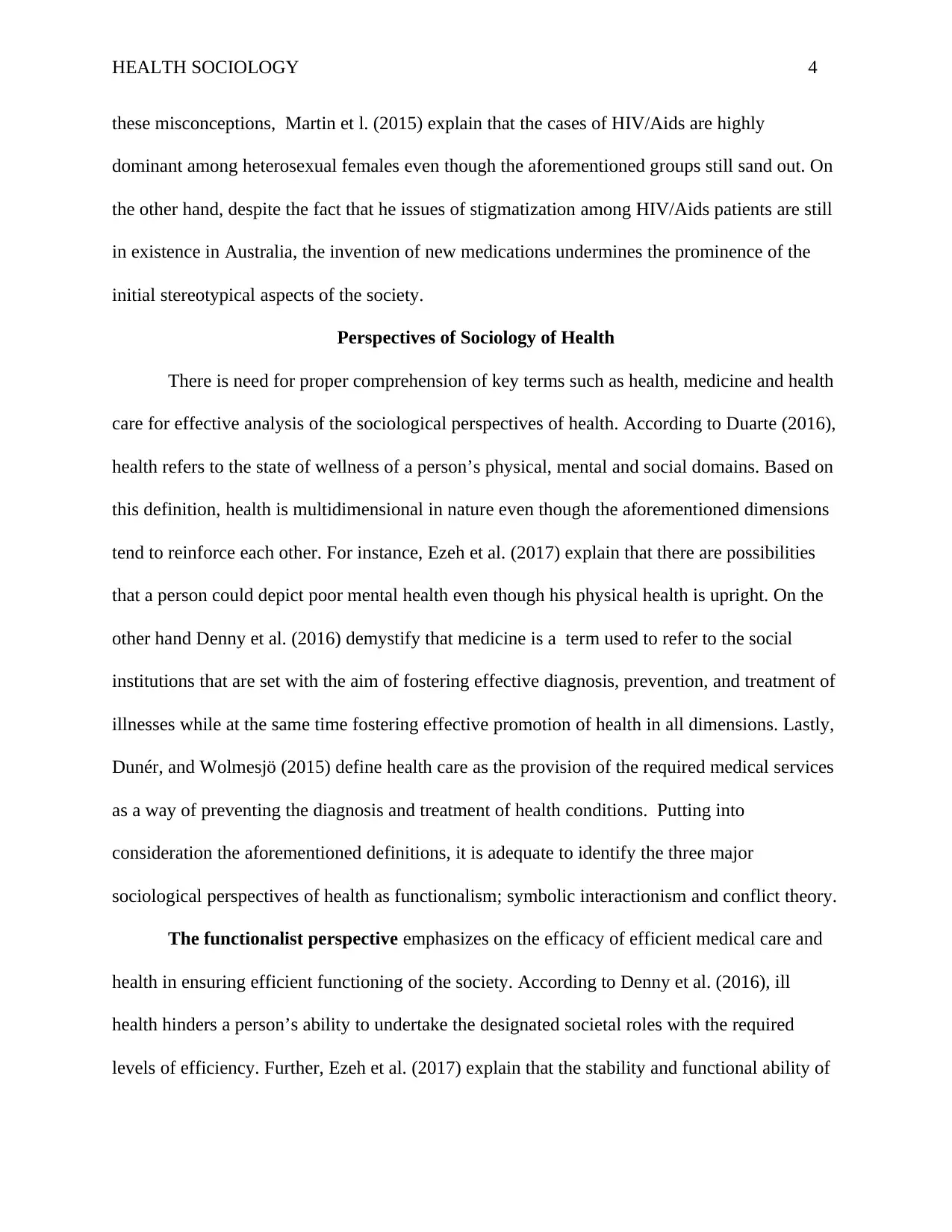
HEALTH SOCIOLOGY 4
these misconceptions, Martin et l. (2015) explain that the cases of HIV/Aids are highly
dominant among heterosexual females even though the aforementioned groups still sand out. On
the other hand, despite the fact that he issues of stigmatization among HIV/Aids patients are still
in existence in Australia, the invention of new medications undermines the prominence of the
initial stereotypical aspects of the society.
Perspectives of Sociology of Health
There is need for proper comprehension of key terms such as health, medicine and health
care for effective analysis of the sociological perspectives of health. According to Duarte (2016),
health refers to the state of wellness of a person’s physical, mental and social domains. Based on
this definition, health is multidimensional in nature even though the aforementioned dimensions
tend to reinforce each other. For instance, Ezeh et al. (2017) explain that there are possibilities
that a person could depict poor mental health even though his physical health is upright. On the
other hand Denny et al. (2016) demystify that medicine is a term used to refer to the social
institutions that are set with the aim of fostering effective diagnosis, prevention, and treatment of
illnesses while at the same time fostering effective promotion of health in all dimensions. Lastly,
Dunér, and Wolmesjö (2015) define health care as the provision of the required medical services
as a way of preventing the diagnosis and treatment of health conditions. Putting into
consideration the aforementioned definitions, it is adequate to identify the three major
sociological perspectives of health as functionalism; symbolic interactionism and conflict theory.
The functionalist perspective emphasizes on the efficacy of efficient medical care and
health in ensuring efficient functioning of the society. According to Denny et al. (2016), ill
health hinders a person’s ability to undertake the designated societal roles with the required
levels of efficiency. Further, Ezeh et al. (2017) explain that the stability and functional ability of
these misconceptions, Martin et l. (2015) explain that the cases of HIV/Aids are highly
dominant among heterosexual females even though the aforementioned groups still sand out. On
the other hand, despite the fact that he issues of stigmatization among HIV/Aids patients are still
in existence in Australia, the invention of new medications undermines the prominence of the
initial stereotypical aspects of the society.
Perspectives of Sociology of Health
There is need for proper comprehension of key terms such as health, medicine and health
care for effective analysis of the sociological perspectives of health. According to Duarte (2016),
health refers to the state of wellness of a person’s physical, mental and social domains. Based on
this definition, health is multidimensional in nature even though the aforementioned dimensions
tend to reinforce each other. For instance, Ezeh et al. (2017) explain that there are possibilities
that a person could depict poor mental health even though his physical health is upright. On the
other hand Denny et al. (2016) demystify that medicine is a term used to refer to the social
institutions that are set with the aim of fostering effective diagnosis, prevention, and treatment of
illnesses while at the same time fostering effective promotion of health in all dimensions. Lastly,
Dunér, and Wolmesjö (2015) define health care as the provision of the required medical services
as a way of preventing the diagnosis and treatment of health conditions. Putting into
consideration the aforementioned definitions, it is adequate to identify the three major
sociological perspectives of health as functionalism; symbolic interactionism and conflict theory.
The functionalist perspective emphasizes on the efficacy of efficient medical care and
health in ensuring efficient functioning of the society. According to Denny et al. (2016), ill
health hinders a person’s ability to undertake the designated societal roles with the required
levels of efficiency. Further, Ezeh et al. (2017) explain that the stability and functional ability of
Paraphrase This Document
Need a fresh take? Get an instant paraphrase of this document with our AI Paraphraser
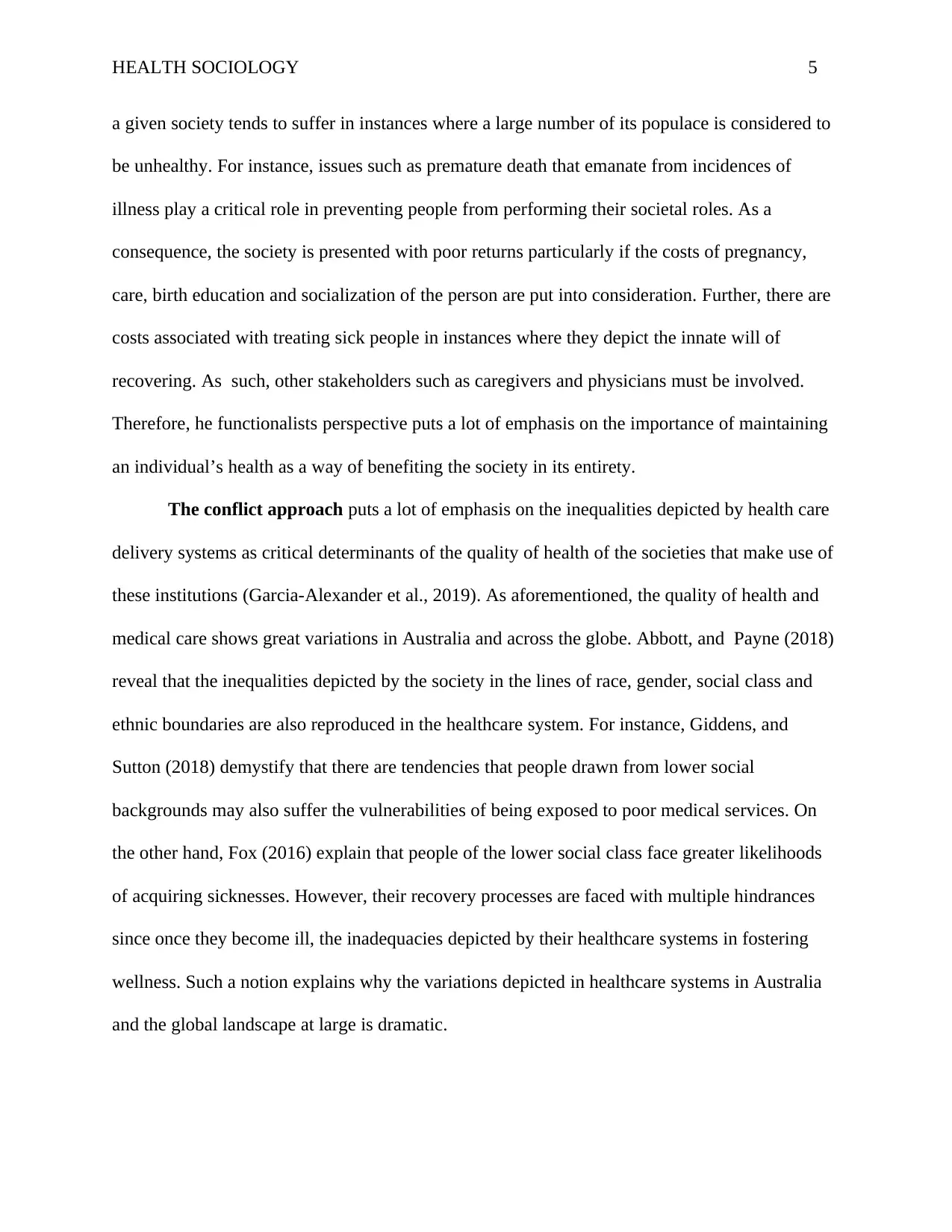
HEALTH SOCIOLOGY 5
a given society tends to suffer in instances where a large number of its populace is considered to
be unhealthy. For instance, issues such as premature death that emanate from incidences of
illness play a critical role in preventing people from performing their societal roles. As a
consequence, the society is presented with poor returns particularly if the costs of pregnancy,
care, birth education and socialization of the person are put into consideration. Further, there are
costs associated with treating sick people in instances where they depict the innate will of
recovering. As such, other stakeholders such as caregivers and physicians must be involved.
Therefore, he functionalists perspective puts a lot of emphasis on the importance of maintaining
an individual’s health as a way of benefiting the society in its entirety.
The conflict approach puts a lot of emphasis on the inequalities depicted by health care
delivery systems as critical determinants of the quality of health of the societies that make use of
these institutions (Garcia-Alexander et al., 2019). As aforementioned, the quality of health and
medical care shows great variations in Australia and across the globe. Abbott, and Payne (2018)
reveal that the inequalities depicted by the society in the lines of race, gender, social class and
ethnic boundaries are also reproduced in the healthcare system. For instance, Giddens, and
Sutton (2018) demystify that there are tendencies that people drawn from lower social
backgrounds may also suffer the vulnerabilities of being exposed to poor medical services. On
the other hand, Fox (2016) explain that people of the lower social class face greater likelihoods
of acquiring sicknesses. However, their recovery processes are faced with multiple hindrances
since once they become ill, the inadequacies depicted by their healthcare systems in fostering
wellness. Such a notion explains why the variations depicted in healthcare systems in Australia
and the global landscape at large is dramatic.
a given society tends to suffer in instances where a large number of its populace is considered to
be unhealthy. For instance, issues such as premature death that emanate from incidences of
illness play a critical role in preventing people from performing their societal roles. As a
consequence, the society is presented with poor returns particularly if the costs of pregnancy,
care, birth education and socialization of the person are put into consideration. Further, there are
costs associated with treating sick people in instances where they depict the innate will of
recovering. As such, other stakeholders such as caregivers and physicians must be involved.
Therefore, he functionalists perspective puts a lot of emphasis on the importance of maintaining
an individual’s health as a way of benefiting the society in its entirety.
The conflict approach puts a lot of emphasis on the inequalities depicted by health care
delivery systems as critical determinants of the quality of health of the societies that make use of
these institutions (Garcia-Alexander et al., 2019). As aforementioned, the quality of health and
medical care shows great variations in Australia and across the globe. Abbott, and Payne (2018)
reveal that the inequalities depicted by the society in the lines of race, gender, social class and
ethnic boundaries are also reproduced in the healthcare system. For instance, Giddens, and
Sutton (2018) demystify that there are tendencies that people drawn from lower social
backgrounds may also suffer the vulnerabilities of being exposed to poor medical services. On
the other hand, Fox (2016) explain that people of the lower social class face greater likelihoods
of acquiring sicknesses. However, their recovery processes are faced with multiple hindrances
since once they become ill, the inadequacies depicted by their healthcare systems in fostering
wellness. Such a notion explains why the variations depicted in healthcare systems in Australia
and the global landscape at large is dramatic.
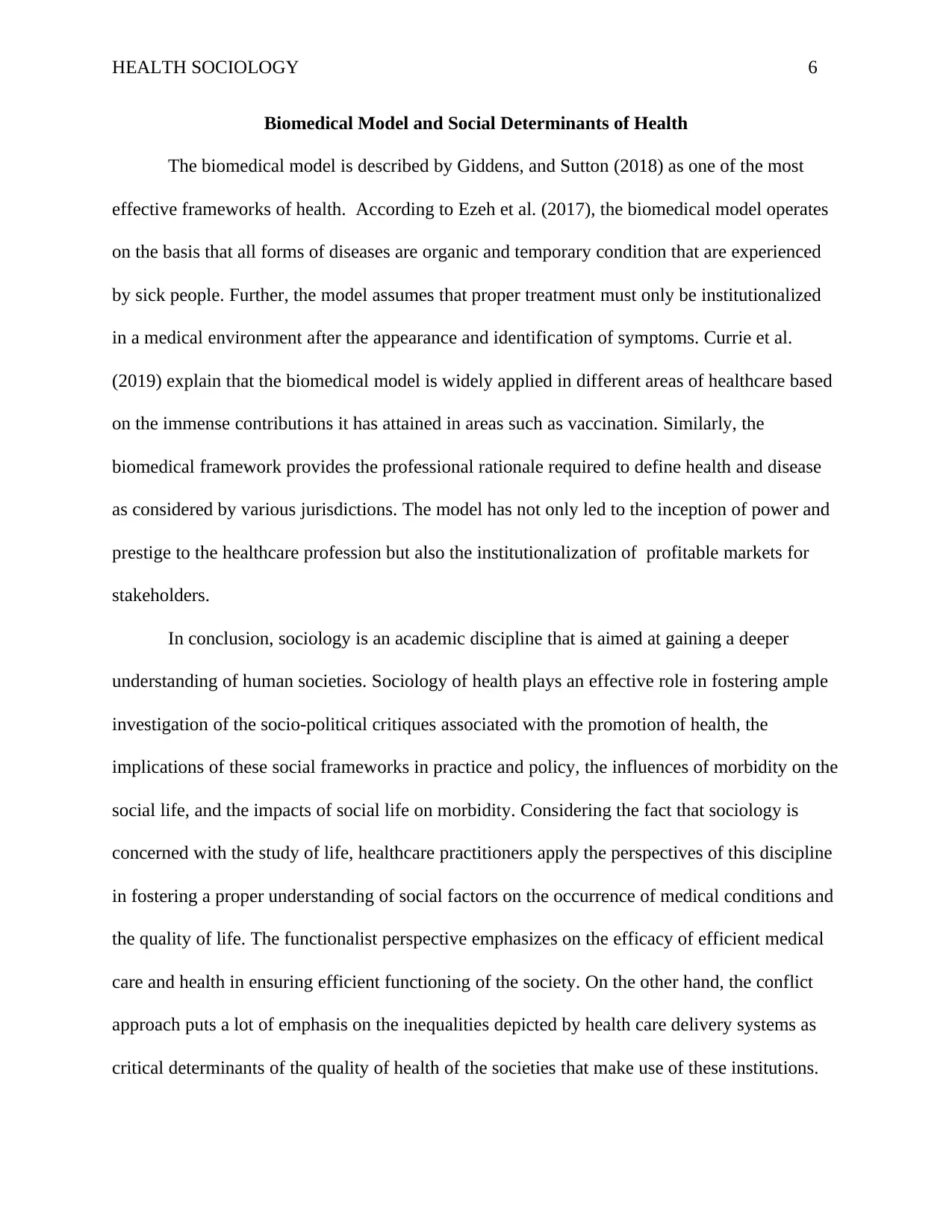
HEALTH SOCIOLOGY 6
Biomedical Model and Social Determinants of Health
The biomedical model is described by Giddens, and Sutton (2018) as one of the most
effective frameworks of health. According to Ezeh et al. (2017), the biomedical model operates
on the basis that all forms of diseases are organic and temporary condition that are experienced
by sick people. Further, the model assumes that proper treatment must only be institutionalized
in a medical environment after the appearance and identification of symptoms. Currie et al.
(2019) explain that the biomedical model is widely applied in different areas of healthcare based
on the immense contributions it has attained in areas such as vaccination. Similarly, the
biomedical framework provides the professional rationale required to define health and disease
as considered by various jurisdictions. The model has not only led to the inception of power and
prestige to the healthcare profession but also the institutionalization of profitable markets for
stakeholders.
In conclusion, sociology is an academic discipline that is aimed at gaining a deeper
understanding of human societies. Sociology of health plays an effective role in fostering ample
investigation of the socio-political critiques associated with the promotion of health, the
implications of these social frameworks in practice and policy, the influences of morbidity on the
social life, and the impacts of social life on morbidity. Considering the fact that sociology is
concerned with the study of life, healthcare practitioners apply the perspectives of this discipline
in fostering a proper understanding of social factors on the occurrence of medical conditions and
the quality of life. The functionalist perspective emphasizes on the efficacy of efficient medical
care and health in ensuring efficient functioning of the society. On the other hand, the conflict
approach puts a lot of emphasis on the inequalities depicted by health care delivery systems as
critical determinants of the quality of health of the societies that make use of these institutions.
Biomedical Model and Social Determinants of Health
The biomedical model is described by Giddens, and Sutton (2018) as one of the most
effective frameworks of health. According to Ezeh et al. (2017), the biomedical model operates
on the basis that all forms of diseases are organic and temporary condition that are experienced
by sick people. Further, the model assumes that proper treatment must only be institutionalized
in a medical environment after the appearance and identification of symptoms. Currie et al.
(2019) explain that the biomedical model is widely applied in different areas of healthcare based
on the immense contributions it has attained in areas such as vaccination. Similarly, the
biomedical framework provides the professional rationale required to define health and disease
as considered by various jurisdictions. The model has not only led to the inception of power and
prestige to the healthcare profession but also the institutionalization of profitable markets for
stakeholders.
In conclusion, sociology is an academic discipline that is aimed at gaining a deeper
understanding of human societies. Sociology of health plays an effective role in fostering ample
investigation of the socio-political critiques associated with the promotion of health, the
implications of these social frameworks in practice and policy, the influences of morbidity on the
social life, and the impacts of social life on morbidity. Considering the fact that sociology is
concerned with the study of life, healthcare practitioners apply the perspectives of this discipline
in fostering a proper understanding of social factors on the occurrence of medical conditions and
the quality of life. The functionalist perspective emphasizes on the efficacy of efficient medical
care and health in ensuring efficient functioning of the society. On the other hand, the conflict
approach puts a lot of emphasis on the inequalities depicted by health care delivery systems as
critical determinants of the quality of health of the societies that make use of these institutions.
⊘ This is a preview!⊘
Do you want full access?
Subscribe today to unlock all pages.

Trusted by 1+ million students worldwide
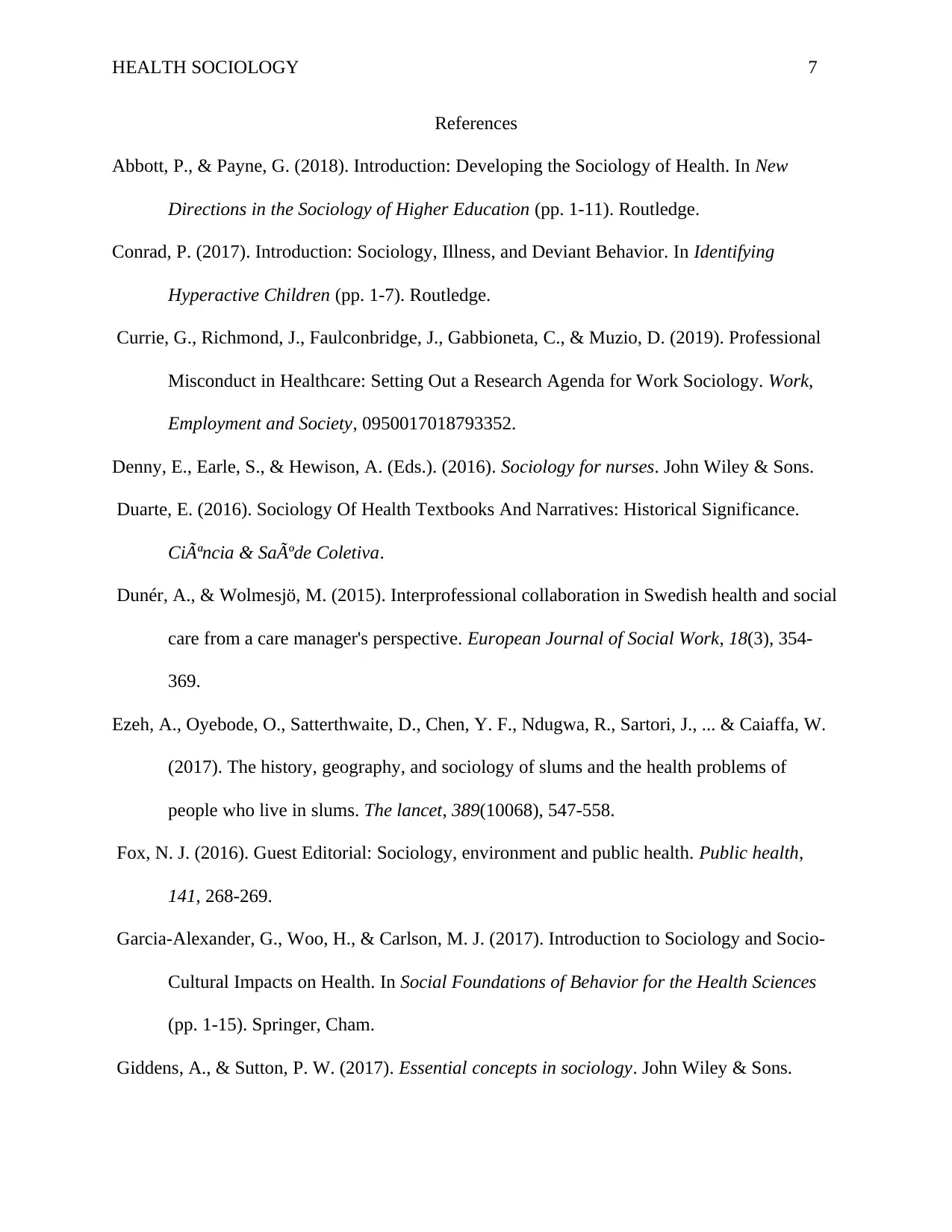
HEALTH SOCIOLOGY 7
References
Abbott, P., & Payne, G. (2018). Introduction: Developing the Sociology of Health. In New
Directions in the Sociology of Higher Education (pp. 1-11). Routledge.
Conrad, P. (2017). Introduction: Sociology, Illness, and Deviant Behavior. In Identifying
Hyperactive Children (pp. 1-7). Routledge.
Currie, G., Richmond, J., Faulconbridge, J., Gabbioneta, C., & Muzio, D. (2019). Professional
Misconduct in Healthcare: Setting Out a Research Agenda for Work Sociology. Work,
Employment and Society, 0950017018793352.
Denny, E., Earle, S., & Hewison, A. (Eds.). (2016). Sociology for nurses. John Wiley & Sons.
Duarte, E. (2016). Sociology Of Health Textbooks And Narratives: Historical Significance.
Ciência & Saúde Coletiva.
Dunér, A., & Wolmesjö, M. (2015). Interprofessional collaboration in Swedish health and social
care from a care manager's perspective. European Journal of Social Work, 18(3), 354-
369.
Ezeh, A., Oyebode, O., Satterthwaite, D., Chen, Y. F., Ndugwa, R., Sartori, J., ... & Caiaffa, W.
(2017). The history, geography, and sociology of slums and the health problems of
people who live in slums. The lancet, 389(10068), 547-558.
Fox, N. J. (2016). Guest Editorial: Sociology, environment and public health. Public health,
141, 268-269.
Garcia-Alexander, G., Woo, H., & Carlson, M. J. (2017). Introduction to Sociology and Socio-
Cultural Impacts on Health. In Social Foundations of Behavior for the Health Sciences
(pp. 1-15). Springer, Cham.
Giddens, A., & Sutton, P. W. (2017). Essential concepts in sociology. John Wiley & Sons.
References
Abbott, P., & Payne, G. (2018). Introduction: Developing the Sociology of Health. In New
Directions in the Sociology of Higher Education (pp. 1-11). Routledge.
Conrad, P. (2017). Introduction: Sociology, Illness, and Deviant Behavior. In Identifying
Hyperactive Children (pp. 1-7). Routledge.
Currie, G., Richmond, J., Faulconbridge, J., Gabbioneta, C., & Muzio, D. (2019). Professional
Misconduct in Healthcare: Setting Out a Research Agenda for Work Sociology. Work,
Employment and Society, 0950017018793352.
Denny, E., Earle, S., & Hewison, A. (Eds.). (2016). Sociology for nurses. John Wiley & Sons.
Duarte, E. (2016). Sociology Of Health Textbooks And Narratives: Historical Significance.
Ciência & Saúde Coletiva.
Dunér, A., & Wolmesjö, M. (2015). Interprofessional collaboration in Swedish health and social
care from a care manager's perspective. European Journal of Social Work, 18(3), 354-
369.
Ezeh, A., Oyebode, O., Satterthwaite, D., Chen, Y. F., Ndugwa, R., Sartori, J., ... & Caiaffa, W.
(2017). The history, geography, and sociology of slums and the health problems of
people who live in slums. The lancet, 389(10068), 547-558.
Fox, N. J. (2016). Guest Editorial: Sociology, environment and public health. Public health,
141, 268-269.
Garcia-Alexander, G., Woo, H., & Carlson, M. J. (2017). Introduction to Sociology and Socio-
Cultural Impacts on Health. In Social Foundations of Behavior for the Health Sciences
(pp. 1-15). Springer, Cham.
Giddens, A., & Sutton, P. W. (2017). Essential concepts in sociology. John Wiley & Sons.
Paraphrase This Document
Need a fresh take? Get an instant paraphrase of this document with our AI Paraphraser
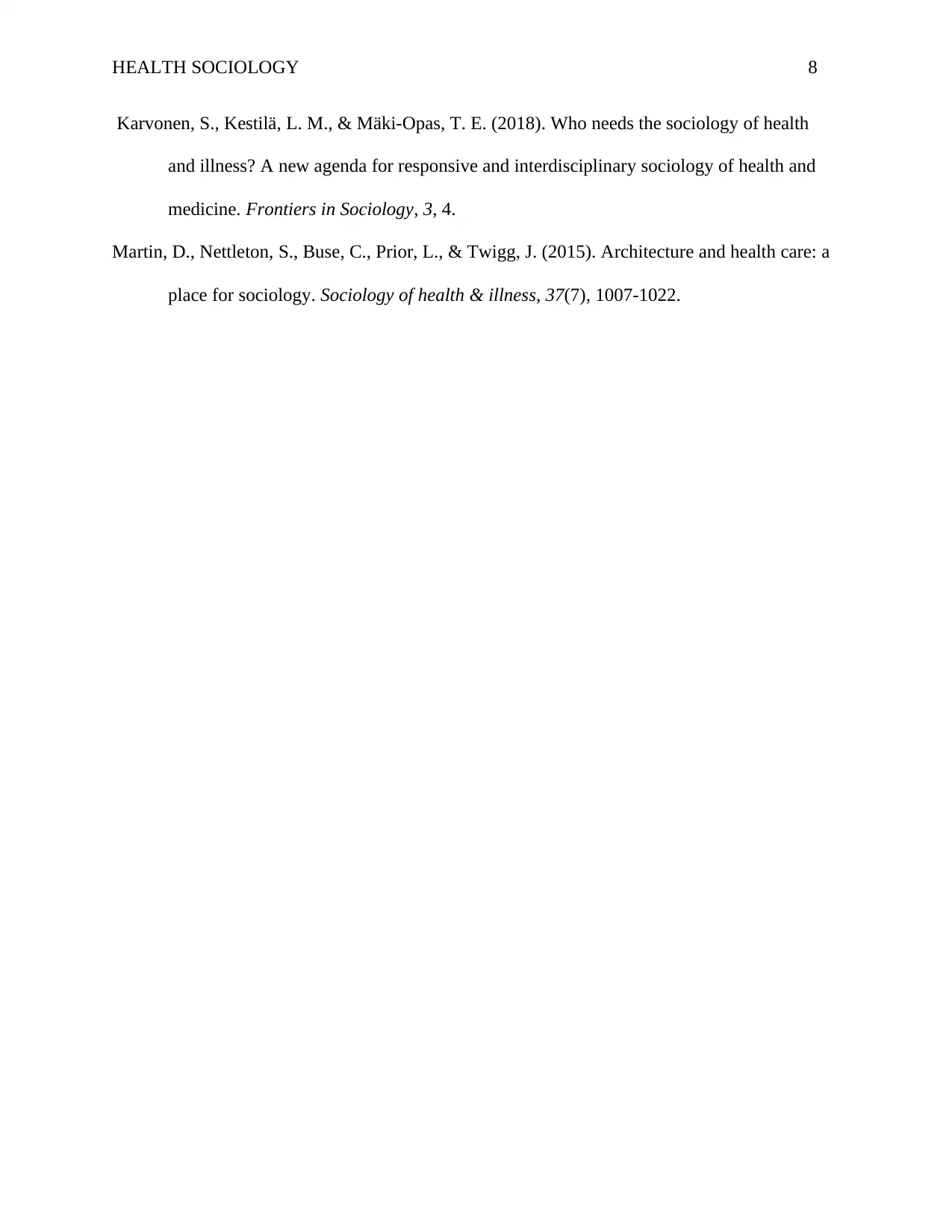
HEALTH SOCIOLOGY 8
Karvonen, S., Kestilä, L. M., & Mäki-Opas, T. E. (2018). Who needs the sociology of health
and illness? A new agenda for responsive and interdisciplinary sociology of health and
medicine. Frontiers in Sociology, 3, 4.
Martin, D., Nettleton, S., Buse, C., Prior, L., & Twigg, J. (2015). Architecture and health care: a
place for sociology. Sociology of health & illness, 37(7), 1007-1022.
Karvonen, S., Kestilä, L. M., & Mäki-Opas, T. E. (2018). Who needs the sociology of health
and illness? A new agenda for responsive and interdisciplinary sociology of health and
medicine. Frontiers in Sociology, 3, 4.
Martin, D., Nettleton, S., Buse, C., Prior, L., & Twigg, J. (2015). Architecture and health care: a
place for sociology. Sociology of health & illness, 37(7), 1007-1022.
1 out of 8
Your All-in-One AI-Powered Toolkit for Academic Success.
+13062052269
info@desklib.com
Available 24*7 on WhatsApp / Email
![[object Object]](/_next/static/media/star-bottom.7253800d.svg)
Unlock your academic potential
Copyright © 2020–2026 A2Z Services. All Rights Reserved. Developed and managed by ZUCOL.

